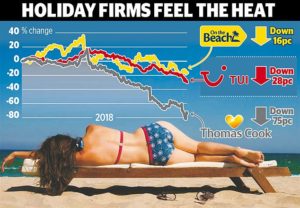MIDAS SHARE TIPS: Why Ramsdens’ pawn shops could put sparkle in your portfolio




Location spread: Ramsdens is based in Middlesbrough and most of its stores are in the North of England
The group benefits from weak competition too, as peers have been hit by payday loan problems and other issues. Ramsdens only lends money against pawn items and 85 per cent of customers repay their loans and retrieve their jewellery, often within a few weeks.
The average borrowing is £220 but some customers take out considerably more, such as £30,000 as down payment for a new Ferrari.
On the foreign exchange side, most customers take out money to see them through the first few days of their holiday, generally around £350.
Holidaymakers are increasingly using cards and online apps for overseas spending but Ramsdens supplies travel cards too and offers international money transfer services for consumers who need to make large purchases abroad.
Stores are invariably bright and attractive, financial transactions take place in special booths and staff are highly trained, with a focus on friendly, efficient service.
Kenyon takes a great deal of time ensuring that sites are well located and decently priced. A banker by profession, he is known for his caution, supported by the rest of the board, all of whom are former chartered accountants.
Brokers expect annual sales to rise at least 12 per cent to £45 million with pre-tax profits flat at £6.5 million, rising to £7 million in 2020. A dividend of 7.1p has been pencilled in for the current year, increasing to 7.8p in 2020.
Keep an eye on carpet firm Victoria as it plans to roll out growth…
The shares of flooring group Victoria were £8.35 in November 2017. On Friday, they closed at £4.60. Yet the business has grown substantially since then.
The company recently unveiled half-year figures to September, showing a 44 per cent increase in sales to £273 million and an 82 per cent increase in underlying profit to £28 million. Brokers predict further strong results for the full year, with sales of £600 million and profits of more than £66 million.
The company came a cropper in October, when it tried to raise money in the bond market and admitted that profit margins were growing less rapidly than chairman Geoff Wilding had previously indicated. The shares fell almost 40 per cent in less than a week and the bond issue was pulled.
Wilding has been trying to reassure the market ever since and the interim figures gave him the chance to show in numbers that the company is financially robust. He also bought a million shares in Victoria, spending almost £5 million to underline his faith in the business. Two other board directors also bought shares, dipping into their own pockets to do so.
So who is right, Wilding and his colleagues or the market?
There is little doubt that Victoria is doing a lot of good things. It is gaining market share, driving down costs and moving into fancy tiles to complement the core carpet business. The group has also launched a value range, to broaden its appeal and sales have responded well. Yet the shares continue to be pummelled, as investors fret about economic conditions and Wilding’s ability to continue delivering growth.






